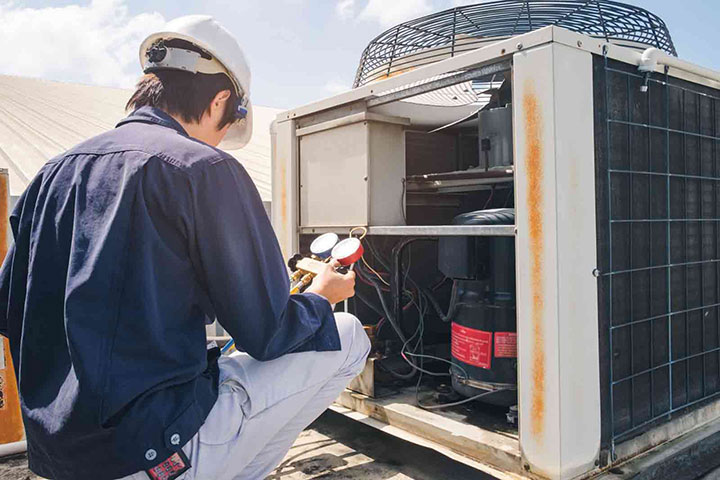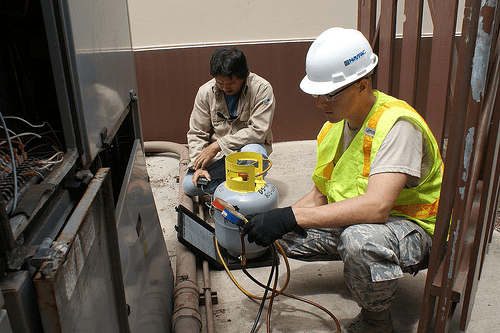DIY or Pro? heat pump service: What You Need to Know
DIY or Pro? heat pump service: What You Need to Know
Blog Article
Choosing In Between a Warm Pump and Furnace: Secret Considerations for Your Heating And Cooling Demands
When assessing home heating options for a/c needs, the choice in between a heatpump and a furnace can be intricate. Each system offers distinct advantages tailored to details climates and energy effectiveness goals. Comprehending these distinctions is essential for making an educated choice. Secret factors such as installation expenses and environmental impact further complicate the selection procedure. Which alternative genuinely straightens with one's convenience and sustainability preferences? The complying with sections will explore these considerations thoroughly.
Understanding Warm Pumps: Exactly How They Work and Their Benefits
While lots of property owners take into consideration different heating alternatives, comprehending exactly how heat pumps feature and their benefits can substantially affect their choice. Warmth pumps operate by transferring warm as opposed to producing it. In the wintertime, they remove warm from the outdoors air or ground and move it inside, while in the summer season, they reverse this procedure, cooling down the home by eliminating heat outside. This twin performance makes them versatile for year-round climate control.One of the primary advantages of heatpump is their energy performance. They use substantially much less power contrasted to typical heating systems, potentially causing lower energy expenses (heat pump replacement ooltewah tn). Additionally, warmth pumps have a smaller sized carbon footprint, making them an eco friendly selection. They additionally call for much less upkeep than standard systems, adding to long-term expense financial savings. In general, comprehending the technicians and advantages of heatpump can assist house owners make informed decisions regarding their home heating and cooling down requirements
Checking Out Heaters: Types, Operation, and Benefits
Heaters come in various kinds, including gas, electric, and oil versions, each with unique functional devices. Understanding these distinctions is crucial, as they affect efficiency and home heating performance. Furthermore, heaters supply various benefits, such as constant heat outcome and integrity in colder climates.
Types of Heaters
Home heating systems can differ significantly in layout and procedure, with heating systems being a prominent selection amongst homeowners. There are several kinds of heaters, each utilizing different fuel sources and modern technologies. Gas heaters are common, leveraging gas to create warm effectively. Electric furnaces, on the other hand, make use of electrical resistance to generate heat, typically favored for their straightforward installation. Oil heating systems, while much less typical, are effective in locations with restricted gas gain access to (furnace replacement). Additionally, condensing heaters maximize energy performance by reusing and recording exhaust gases. Each type runs with a system of heat exchangers and ductwork to distribute warm air throughout a home. Recognizing the differences in between these heater kinds is essential for educated heating and cooling choices
Benefits of Furnaces
For home owners seeking dependable heat during cool months, the advantages of heaters are considerable. Furnaces offer regular heating, guaranteeing also temperature levels throughout the home. They are particularly effective in severe cold, often exceeding heat pumps in icy conditions. Numerous types, consisting of gas, electrical, and oil heating systems, offer adaptability to satisfy diverse requirements and preferences.Furnaces likewise tend to have lower first installation prices contrasted to heat pumps, making them a more easily accessible choice for lots of. Their durable layout adds to a longer life-span, with many systems lasting over 15 years with correct upkeep. In addition, modern furnaces are usually geared up with sophisticated modern technology for boosted efficiency, which can bring about reduced energy costs. In general, heating systems continue to be a reliable selection for reliable home heating.

Energy Effectiveness: Contrasting Warm Pumps and Furnaces
When comparing energy effectiveness between heatpump and heaters, the Seasonal Energy Effectiveness Proportion (SEER) plays a vital role in identifying efficiency. Additionally, an operational cost analysis exposes the lasting financial implications of each system. Comprehending these factors can direct property owners in making informed decisions regarding their home heating solutions.
Seasonal Power Performance Ratio
Power performance plays a vital duty in the decision-making process in between warmth pumps and heaters, specifically when taking into consideration the Seasonal Energy Effectiveness Proportion (SEER) This statistics steps the cooling efficiency of heatpump over an entire air conditioning period, supplying a standard way to assess efficiency. Greater SEER ratings suggest higher power performance, translating to lower power intake and decreased energy bills. On the other hand, heating systems are generally assessed making use of the Annual Fuel Utilization Efficiency (AFUE) rating, which mirrors home heating effectiveness. When comparing these 2 systems, homeowners need to focus on SEER ratings for heat pumps, as they straight impact overall energy financial savings and environmental sustainability. A thorough understanding of SEER can significantly affect the lasting satisfaction and cost-effectiveness of the chosen HVAC remedy.
Functional Cost Analysis
Comprehending the operational expenses related to heatpump and furnaces is important for homeowners examining their options. Heatpump generally use higher power performance, converting electric energy right into warm with minimal waste. This leads to reduced monthly utility expenses, specifically in modest environments. Conversely, typical furnaces, specifically gas versions, might have lower ahead of time prices however can sustain higher functional expenditures in time as a result of fuel prices and effectiveness ratings.Moreover, heatpump can operate as both heating and cooling down systems, potentially minimizing the demand for separate a/c devices. While first financial investments for warmth pumps may be greater, their long-term financial savings in power performance can make them a more economical option for several houses. Mindful analysis of local power prices is vital to establish the most effective choice.
Installment Expenses: What to Anticipate for each and every Heating Unit
Setup expenses for heater can vary considerably in between heat pumps and heaters, influencing property owners' choices. Heatpump usually have greater ahead of time installation prices, commonly varying from $3,500 to $8,000, depending upon the system size and intricacy of setup. This includes the exterior device, interior handling system, and essential ductwork adjustments. Alternatively, furnaces tend to have reduced preliminary expenses, balancing between $2,500 and $6,000, which can be appealing for budget-conscious house owners. Nevertheless, installation expenditures can boost if substantial ductwork is required.Moreover, the selection of fuel kind for heating systems-- natural gas, lp, or electric-- can also impact setup expenses. While heat pumps provide power efficiency, their first investment may deter some customers. Inevitably, assessing setup costs together with long-lasting savings and efficiency will aid home owners Our site in making informed choices concerning their heater.
Environment Considerations: Which System Does Much Better in Your Area
How do environment problems affect the performance of heating unit? The performance of heatpump and furnaces can differ considerably depending on the neighborhood climate. In modest environments, heatpump excel by effectively moving warmth from the outside air, making them an energy-saving option. Nevertheless, their efficiency reduces in incredibly chilly temperature levels, where they might have a hard time to remove adequate heat. On the other hand, heaters, specifically gas models, supply consistent and trusted warm no matter outside conditions, making them preferable in colder regions.In areas that experience milder winters, heatpump can run effectively year-round, giving both heating & cooling. In contrast, regions with extreme winters frequently profit from the effectiveness of heating systems. Ultimately, recognizing the regional climate is crucial when determining between a heatpump and a heating system, as it straight affects their operational effectiveness and total performance.
Upkeep Requirements: Long-Term Take Care Of Warm Pumps vs. Furnaces
While both warm pumps and heaters need normal maintenance to wikipedia reference ensure peak efficiency, their details needs and treatment regimens differ significantly. Heaters usually require much less frequent interest, with annual inspections being sufficient to look for gas leakages, tidy filters, and assess total performance. Their less complex style often permits simple repairs.In contrast, warmth pumps require biannual upkeep as a result of their dual duty in heating and air conditioning. This consists of cleansing coils, checking refrigerant degrees, and making sure that both the exterior and indoor units work at their ideal. Furthermore, heat pump maintenance typically entails more elaborate components, making expert maintenance essential.Neglecting upkeep can bring about reduced performance and enhanced energy expenses for both systems. Ultimately, house owners need to think about these lasting care needs when choosing between a heatpump and a furnace, as positive upkeep can extend the lifespan and efficiency of either system considerably.
Environmental Impact: Selecting a Sustainable Home Heating Alternative
The ecological impact of heating unit is a crucial examination for home owners looking for sustainable choices. Heatpump are usually more energy-efficient than standard heaters, as they move warm instead of generate it, significantly minimizing carbon discharges. By making use of eco-friendly power sources, such as air-source or geothermal warm pumps, house owners can better minimize their environmental footprint.On the other hand, natural gas heaters give off greenhouse gases and add to air pollution, though they often supply greater warm output. Nevertheless, innovations in modern technology have actually resulted in the growth of high-efficiency heaters that reduce emissions.Ultimately, choosing a heating unit entails considering performance against environmental impact. Homeowners are encouraged to mirror on regional power resources and rewards for eco-friendly systems, making sure a selection that aligns with both individual comfort and ecological duty. The choice affects not only immediate comfort but likewise long-term sustainability and ecological health and wellness.
Regularly Asked Concerns
For How Long Do Warm Pumps and Furnaces Typically Last?
The life-span of heatpump commonly ranges from 15 to twenty years, while furnaces can last in between 15 to 30 years. Regular upkeep significantly influences their longevity and efficiency in offering heating solutions.
Can I Utilize a Warm Pump in Extremely Cold Climates?
Warmth pumps can run in incredibly cold environments, however their effectiveness reduces as temperature levels drop. In such conditions, additional heating resources may be essential to preserve comfy indoor temperature levels and assure peak performance.

What Is the Noise Level of Heat Pumps Versus Furnaces?
The sound levels of heatpump and furnaces differ significantly. Typically, click here for info heatpump run more silently than conventional heaters, making them better for those sensitive to appear, while furnaces may create louder functional sounds during heating cycles.
Are Warm Pumps Suitable for Both Heating and Cooling?
Heatpump are without a doubt ideal for both heating and cooling (furnace replacement). They function by moving warmth, providing efficient temperature level control year-round, making them a functional choice for home owners looking for an all-in-one a/c service
What Dimension Heating Unit Do I Need for My Home?
Identifying the ideal size heating unit for a home requires evaluating aspects such as square video footage, insulation high quality, neighborhood climate, and the home's design. Consulting a specialist can guarantee an accurate evaluation and ideal comfort. Heat pumps typically use greater power performance, converting electric energy into warmth with very little waste. In modest environments, warmth pumps stand out by successfully moving heat from the outside air, making them an energy-saving choice. Alternatively, furnaces, particularly gas designs, give reputable and constant warmth no matter of exterior problems, making them more suitable in cooler regions.In areas that experience milder winters, heat pumps can operate efficiently year-round, giving both heating and air conditioning. Warm pumps are normally extra energy-efficient than typical furnaces, as they transfer warm rather than produce it, considerably lowering carbon discharges. By using sustainable energy sources, such as geothermal or air-source heat pumps, house owners can further decrease their eco-friendly footprint.On the various other hand, all-natural gas heating systems send out greenhouse gases and contribute to air contamination, though they usually supply higher warm result.
Report this page